Loan Officer Skills & Abilities
Top 5 Must Know Skills
Mortgage Loan Officers (MLOs) work one of the most important jobs in the financial world. They have an incredible wealth of knowledge to be able to do so.
Because of the high stakes, successful loan officers pull in seven-figure paychecks.
How can you work your way to this top spot?
The process involves a LOT of money and assessing complex financial data. You will have to develop the right loan officer skills and abilities.
In the next 15 minutes, we’ll cover the full list of MLO skills, personality traits, and education to help you excel.
Let’s check them out!

Chapters
chapter 1:
Loan Officer Interpersonal Skills
Contrary to popular belief, loan officers DON’T spend all of their time crunching numbers on a screen.
A large portion of your success will be attributed to your ability to network with other professionals in the mortgage industry, and get involved with the community outside the mortgage space.
In fact, Hubspot finds that 92% of consumers trust referrals from people they know!
So let’s talk logistics. How on earth do you find the time to meet your networking commitments?
Follow the simple checklist we left for you below!

1. Listening Skills
“Listen more than you talk.”
As loan officers, this adage rings especially true. Listening – active listening – is an important part of effective communication.
While it’s important to share your mortgage expertise with home applicants to help them reach a decision, it’s equally important to give clients the floor.
Ask them open-ended questions to learn their specific needs and goals:
- Tell me about your future goals and plans.
- Why did you choose this moment to invest in a house?
- What is your biggest priority when choosing a mortgage product?
And as the mortgage process moves forward, you want to keep an ear out for any additional questions they may need clarity on.
So let’s talk about active listening. How exactly do you use that with a borrower?
With active listening, you give them your undivided attention, lean in, smile, nod at key points, and follow up with important questions. It helps empathize with the other person.
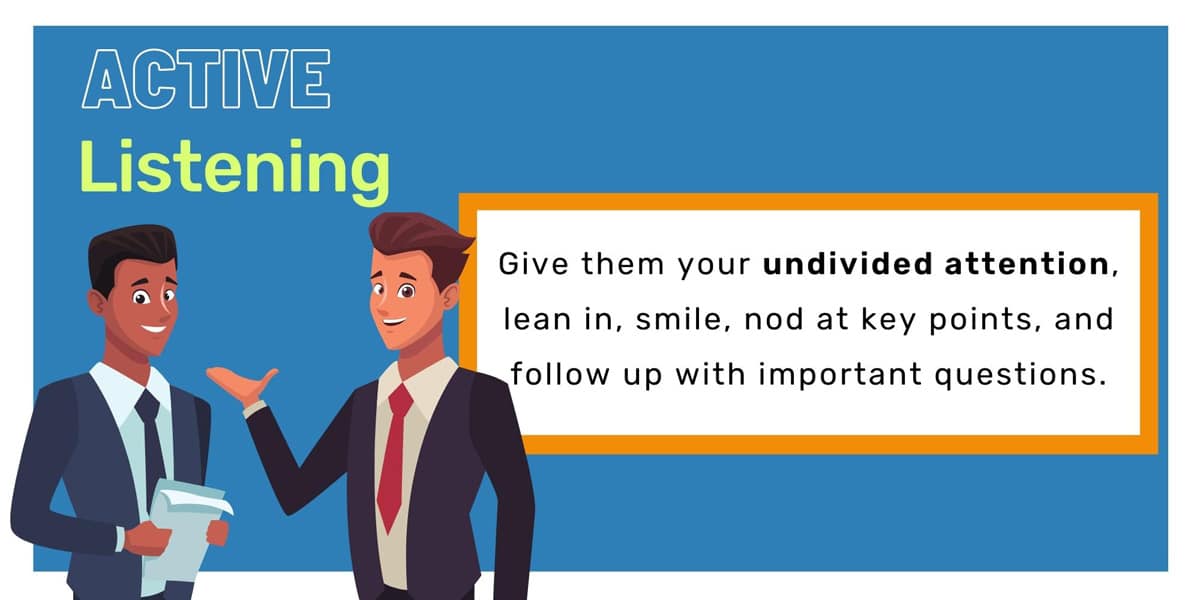
One of the most effective components of active listening is to ENGAGE with their concerns; reiterate what the person has said to make them feel truly heard and understood.
What should you avoid when engaging in active listening:
- Interrupting
- Responding vaguely or illogically to what was just said
- Looking away from the speaker (at your phone, watch, around the room)
- Fidgeting (tapping on something, clicking a pen)
I would highly recommend you check out Kate Murphy’s book “Your Not Listening“. It’s a powerful guide to help you understand what you’re missing and why it matters.
Remember, there is a huge emotional connection to the home buying process. Borrowers need to feel assured that they’ve made the right choice with their lending product AND their loan officer!
2. Conflict Management Skills
Strong conflict management skills can get you VERY far as a loan officer.
On the daily, you’ll be corresponding with so many different people; borrowers, underwriters, real estate agents, supervisors, and everyone in between!
Miscommunication often happens. Even small disagreements could flare up into big disputes. This could cause you to lose accounts, lose commissions, and even lose future clients (referrals are so important for MLOs)!
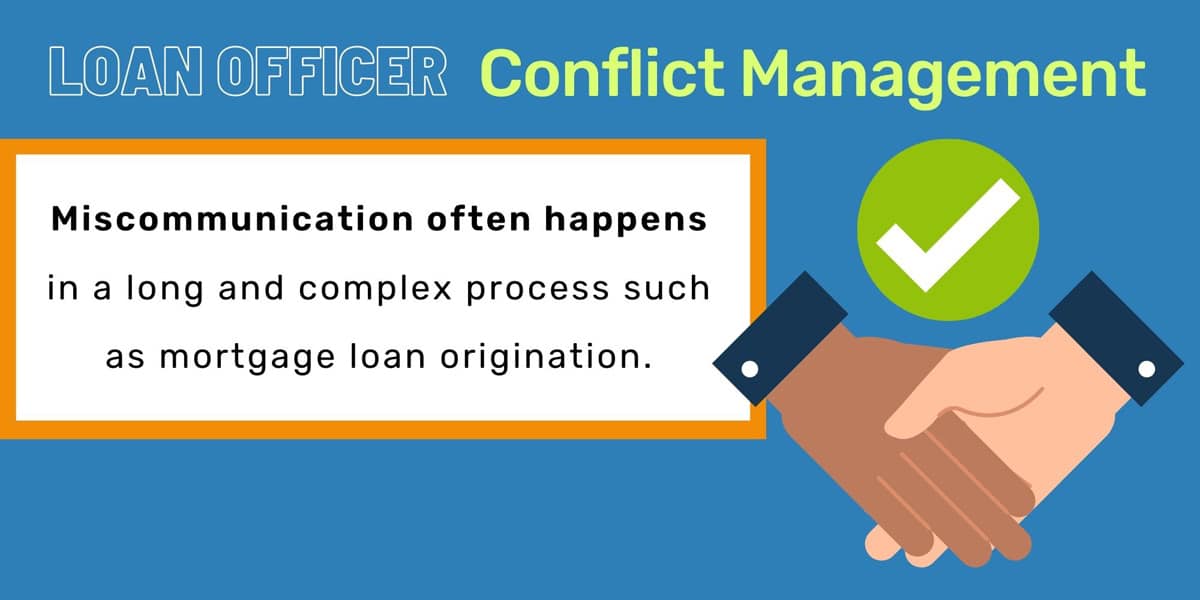
You’d probably agree…
It’s practically a SUPERPOWER to be able to diffuse conflict in a timely manner.
How do you teach yourself this essential skill? Think about these 3 ingredients:
a. Emotional Intelligence (EI)
Loan officers with a high EI have a strong sense of self-awareness. They are able to accurately pinpoint their own feelings and manage them accordingly.
Because of this, they are able to pick up on emotional cues from their clients and react to their needs positively.
Daniel Goleman, acclaimed behavioral science expert, found that as much as 80% of adult success comes from a high EQ. In many cases, it even beats out a high IQ to perform well on the job.
b. Empathy
Empathy is a powerful offshoot of a high EI. It enables you to view a situation from the borrower’s standpoint, giving it a whole new meaning.
Once you are able to spot people’s motivations, needs, and misgivings, you can resolve conflict that much more efficiently.
How do you develop empathy? Work on noticing non-verbal cues, managing your own emotions, displaying compassion, and embracing different points of view.
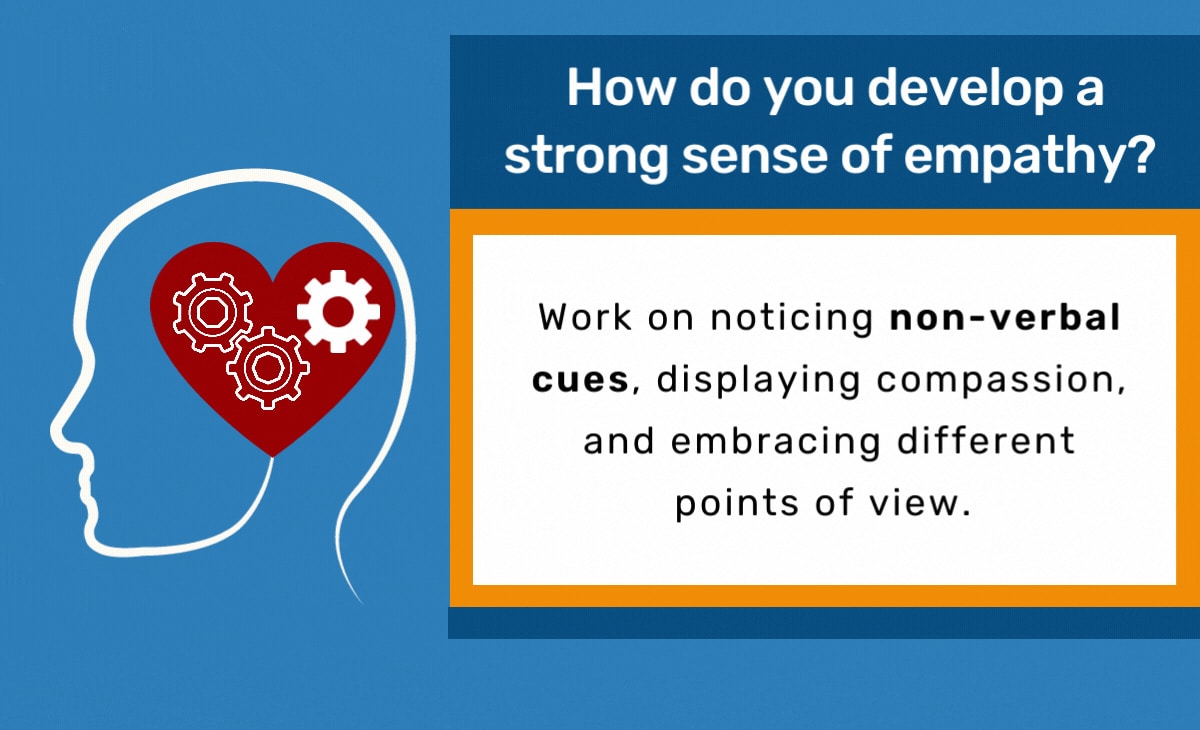
c. Problem Solving
Part of your job as a loan officer is to put out fires.
Although mortgage loan origination can be a technical field, it also involves TONS of creativity – Creative problem solving to be more specific!
To be able to resolve conflict as a loan officer, you need to come up with workable solutions – often without a heads up.
There are so many issues that could arise from your clients, company, and the industry in general.
If you’re able to be flexible, break down complex problems into smaller issues, and take action (however uncomfortable) – whether that is an awkward phone call or giving bad news – you will be a successful problem solver!
3. Written & Spoken Communication Skills
Step into the borrower’s shoes for a second…
Imagine you had a loan officer who was responsible for handling hundreds of thousands of dollars of your money, and they suddenly go silent.
Scary, isn’t it?
ICE Mortgage found:
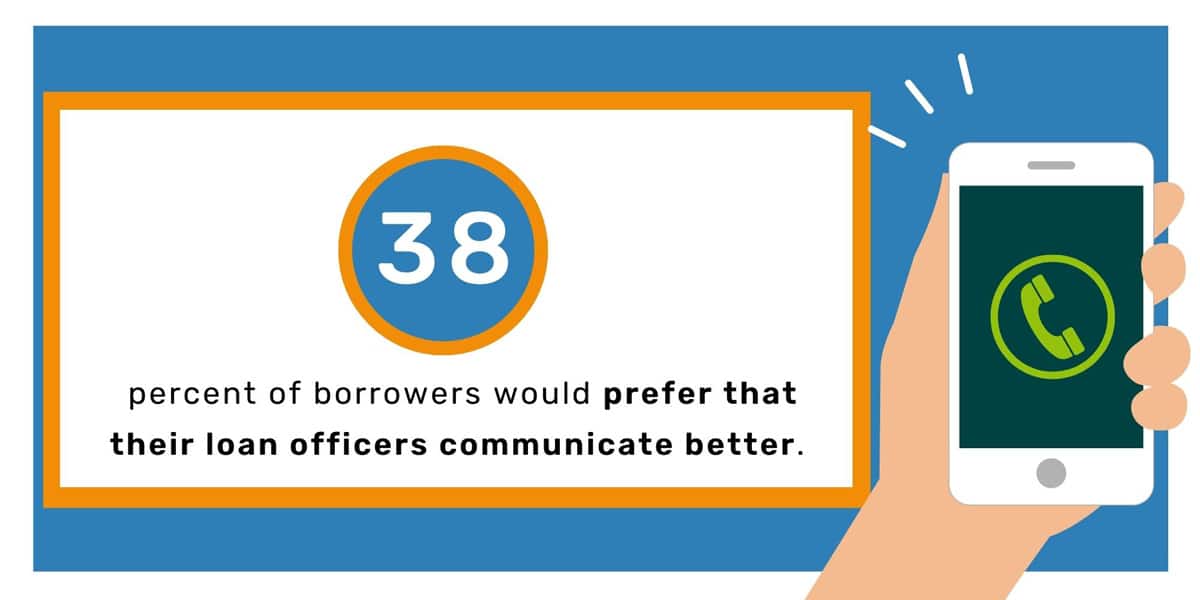
The most common phrase used in negative reviews runs along the lines of, “calls and emails weren’t returned within a reasonable timeframe“.
As a loan officer, it’s important to maintain regular and consistent communication with your clients. This makes them feel inclusive and confident in their choice of mortgage.
In fact, prioritizing your current clients is even more important than chasing new ones, given how much of your future business will come through referrals!
Once you’ve gotten the hang of these soft skills, it’s time to expand your loan officer reach and grow your earnings. Remember, the more loans you can originate, the higher your commissions that month!
What are the most effective strategies to get your name out there?
Here’s what we suggest…
chapter 2:
Loan Officer Outreach & Networking
An MLO working for a larger institution, like a bank for example, is more likely to receive a salary, commission and benefits. They have access to a ready stream of client walk-ins and prospect phone calls.
On the flip side, a small state-licensed mortgage broker may have to solely rely on commissions for their income.
At times, your commission may even be dependent on a monthly quota, i.e. if you close “X” value in loans every month, you’ll get paid a big commission. If you fall short of that goal, you may just receive a fixed minimum dollar amount for each loan.
Let’s talk numbers!
We’ll break this down by salary, commission and also map out the most common benefits that MLOs receive.

1. The Dream 100 Strategy
The Dream 100 Strategy was developed by Chet Holmes, sales and marketing expert.
In it, he explains that the secret to building your dream business is to narrow your focus to your dream customers – and avoid the temptation of trying to sell to everyone.
Remember, when everyone is your audience, no one is your audience.
Create a list of 100 of your most ideal clients, collaborators, partners, and companies. Work that list relentlessly until you’ve nurtured real relationships with your Dream 100!
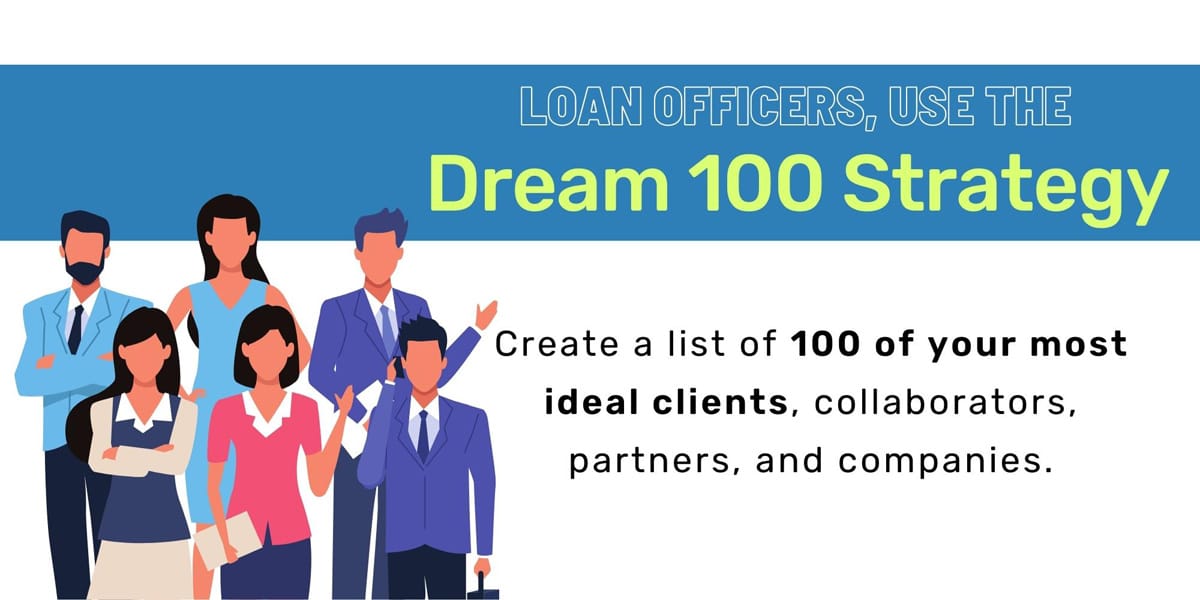
For instance, as a loan officer your Dream 100 could look something like:
- 20 real estate agents
- 20 financial advisors
- 20 insurance brokers
- 20 new families looking for a mortgage
- 20 social media influencers in the mortgage space
Once you’ve built your list, you’re ready for the next step…
2. Cold Calling
Most salespeople cringe at the prospect of cold calling. They are afraid of coming off as boring and impersonal, or being hung up on before they even complete their pitch.
It certainly helps to create an MO that is proven to turn leads into clients!
The trick here is to not make ‘too’ cold a call. If you’re simply working off a lead’s name and number, it could be very tricky to keep their attention.
We suggest starting with a little research online to find out what you can about your prospect; things like age and employment status, for instance.
This is a wonderful way to personalize the conversation to their stage in life.
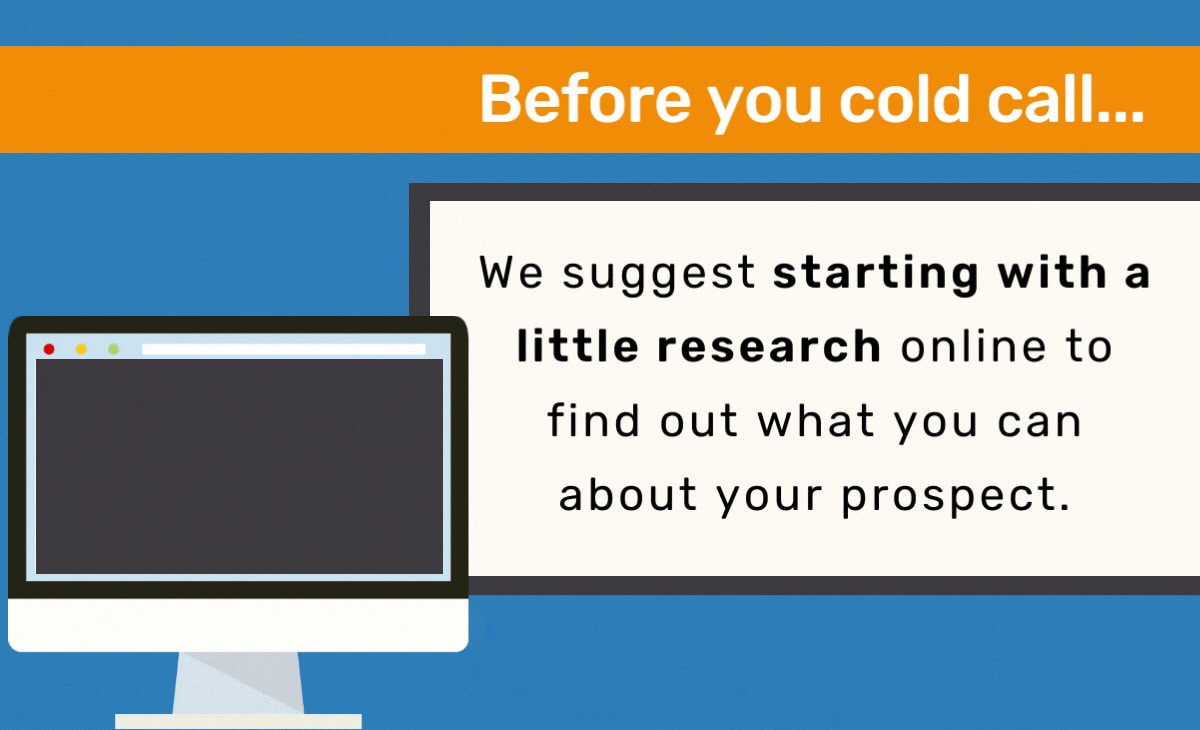
As always, let your personality show! People want to engage with people, not a sales pitch.
And we would be remiss if we didn’t remind you to LISTEN more than you talk.
You will be able to engage with their words and follow up with questions. This could mean a better chance of closing.
3. Email Outreach
It’s an open secret that email marketing is HUGE.
Mail Gen found that 89% of marketers use email for generating leads. And Litmus found that email marketing yields a 3600% ROI, generating an estimated $36 for every $1 spent!
How do you make email marketing work for you as a loan officer?
Remember, you’re emailing people with the intent of starting a conversation. You want to be engaging and warm.
After all, you will be reaching out to people at different stages in their lives.
The goal is to educate and connect with prospective borrowers – including people who may not need your services right now, but could reach out in the future so long as you stay in touch and are top-of-mind!
The first step is to create a contact list.
Focus on contacting people who have opted in to get your emails, either via your website, in-person or a lead source. Make sure to avoid buying an email list.

With a bought list, you won’t get qualified contacts, and you’ll most likely irritate recipients and get marked as Spam.
Once your address gets a certain number of Spam reports, you could automatically be identified as Spam even for legitimate future prospects.
Finally, think about sending regular (not daily, don’t overwhelm them) newsletters that could be insightful for your recipients; market updates, latest mortgage products, internal company news, home safety tips – Get super creative!
4. Referral Partners
Referrals are an incredibly vital source of new clients for loan officers.
Outbound Engine found that 87% of loan officers find referrals to be their most successful marketing tactic!
How do you go about building your referral network? Start with your community!
Think about providing complimentary seminars at your local church, alma mater, or community center on how to secure a mortgage or the benefits of maintaining a good credit score.
That said…
Real estate agents are your strongest source of referrals.
Be present at open houses and provide free information about borrower financing options and the mortgage process in general. Make sure to keep your business card handy on these occasions.

Focus on forming partnerships with real estate agents by being generous with your knowledge and time!
And don’t forget about your past clients! After closing a loan, send your clients a gift basket, visit them at their home, and continue to stay in touch.
- Feel free to ask for referrals – This is one of the best sources of future clients!
5. Use a CRM
CRMs or Customer Relationship Management software are a lifeline for loan officers! Remember, the mortgage industry is very competitive. You constantly have to stay on top of your game.
Maintaining a CRM is one of the most effective ways to do that.
A CRM helps you track your loan prospects, manage your clients, convert leads, validate applications, send regular follow-ups, and so much more.
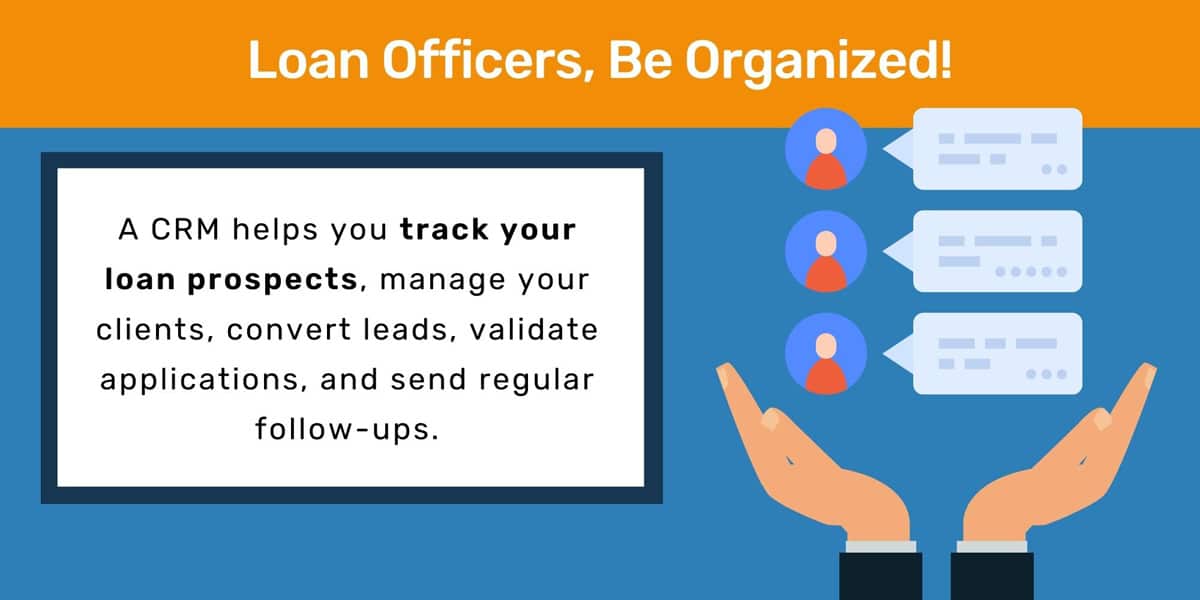
You can automate the process; email sequences, lead nurturing, online appointments, testimonial requests, document sharing, and more to reduce human error!
You’ll have easy access to all of the client’s information and property details handy when they give you a call.
This portrays you as highly competent and informative – and builds trust. And trust is more valuable than gold in the mortgage world!
6. Website & Social Media
In our highly digital world, where would you be without a website and social media presence?
The Social Media and Sales Quota Survey finds that 72% of salespeople who use social media routinely outperform their peers and cross over their quota 23% more often.
Loan officers who are active on social media show potential borrowers that they are in business and ready to help!
By optimizing your website for search engines, you can draw clients in to find you, instead of spending so much time prospecting. As a loan officer, time is money. You want to make your online properties work for you.
One of the most effective techniques to do this is to meet clients where they are already at.
If you find that your demographic hangs out on Facebook, meet them there! Share videos that explain the mortgage process, informative posts, photos from networking opportunities, client closings, and more.
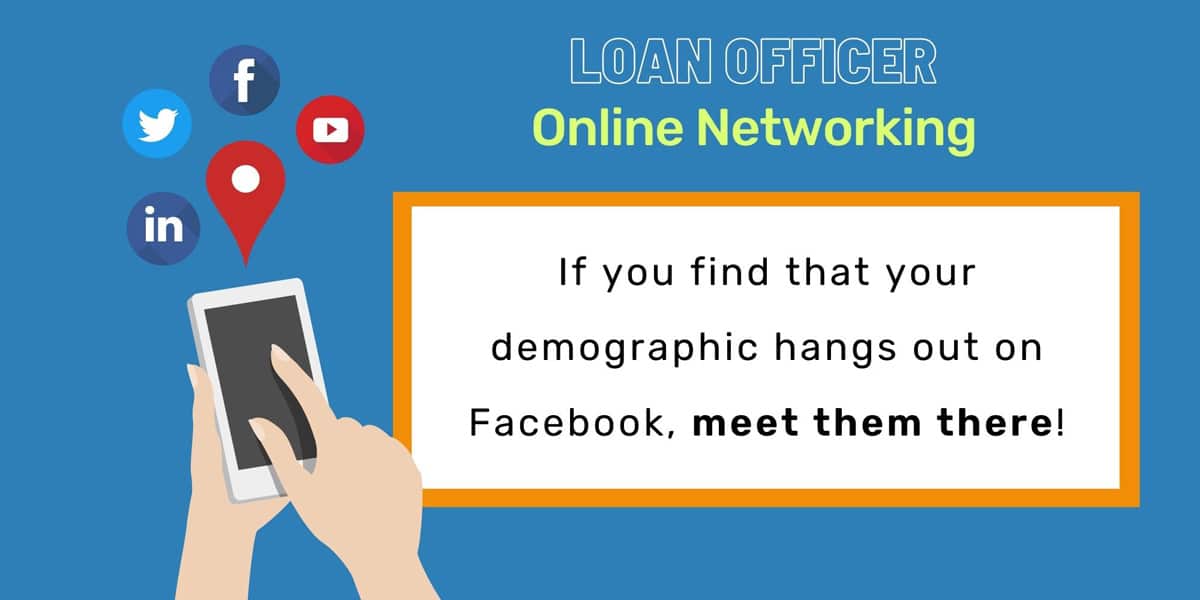
Make sure to engage with your comments and instant messages, and form as many vital connections as you possibly can.
Protip: Remember, outreach and networking don’t mean much without sales skills.
Let’s take a look at that right now!
chapter 3:
Loan Officer Sales & Negotiation Skills
Your success as a loan officer is shaped by your sales and negotiation skills.
We mean it!
Knowing how to negotiate creates win-win situations. It is a powerful tool that will build better relationships and deliver long-term financial success in your career as an MLO.
And here’s the kicker: Indeed found that loan officers with sales experience earn 10.60% more than the average base salary!
So how do you go about nurturing your sales skills? Here’s what we recommend…

Our Top 5 Sales & Negotiation Secrets
Negotiation is the essence of everyday life. We negotiate with our bosses, our kids, our handymen, and even with our pets. You simply cannot drive lasting results without knowing how to negotiate.
As a loan officer, we suggest working on these 5 tactics to smoothly influence interactions towards your desired outcomes.
1. Use Force Luke
Even loan officers can learn a thing or two from Obi-Wan Kenobi.
In the Star Wars universe, Force Luke is described as an energy field created by all living things that binds the galaxy together.
From a business sense, we have The Law of Attraction.
Thought influences outcome. In fact, salespeople often use The Law of Attraction to deeply visualize the successful completion of their goals.
And not just salespeople. We even see celebrities, sportspeople, and entrepreneurs use The Law of Attraction to “attract” success!
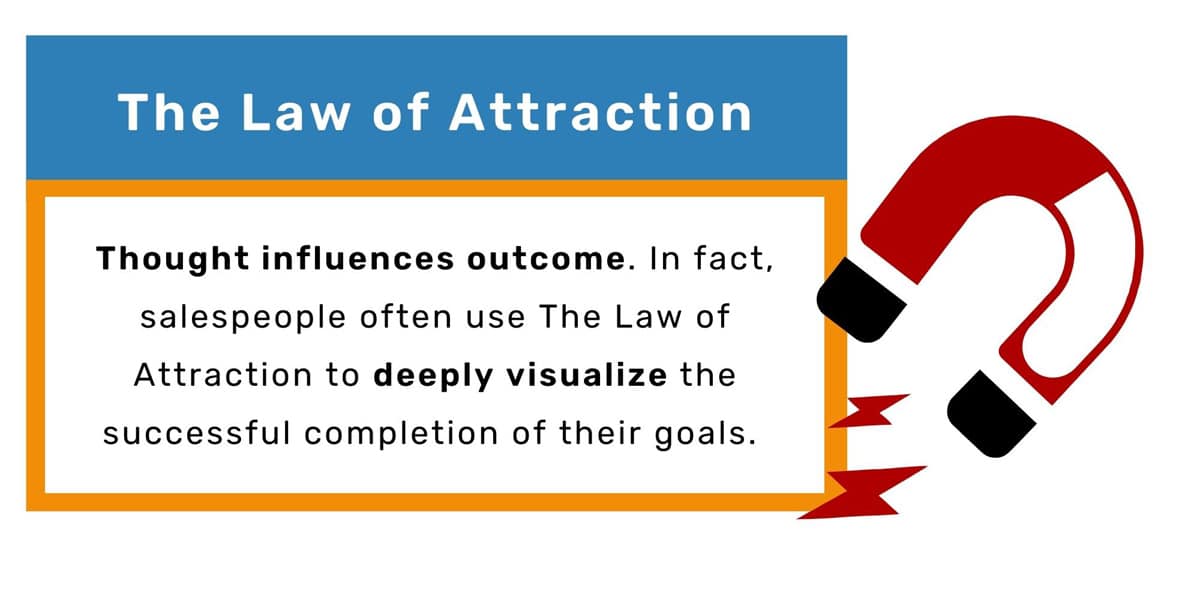
How do you use the Law of Attraction in sales? We have a checklist that can help you build out this technique:
● Prepare
Put yourself in a calm state of mind. You need to have no doubt or conflict in your head.
● Request
It’s time to place your order!
Tell the universe for what you want. Vividly shift your language and thoughts to this desire. Be as vivid and precise as possible.
● Believe
After you’ve visualized what you want to attract, it’s time to believe it wholeheartedly. Try replacing hope with expectation. Believe that your success is already on the way.
Don’t just ask, know.
● Receive
Keep yourself open to signs from the universe. These signs will confirm whether or not you’re on the right path. Be receptive to receiving what you want to attract and pick it up when it comes your way.
● Act
Once you’ve planted positive images about your desired outcomes, it’s time to act on them. Create a momentum for yourself with the FULL belief that you WILL receive what you set out to get – No questions.
Remember, we still have to work hard and act upon the things that we know are going to come our way. We can’t just sit on the couch playing video games and expect the universe to deliver. We have to be there to pickup the deliveries of the universe.
Even if we throw out all of the ethereal woo woo side of the laws of attraction, it’s still a such a powerful tool because of what you will attract with the confidence in yourself. People love to work with Loan Officers that believe in what they are doing and demonstrate a powerful belief in themselves. Really, you should try it!
To bolster the effectiveness of The Law of Attraction, let’s look at the next secret of a successful salesperson…
2. Try the Power of Silence
In any conversation, we are tempted to fill in awkward silences. This is especially so when we want to convince the other party of a counter-argument.
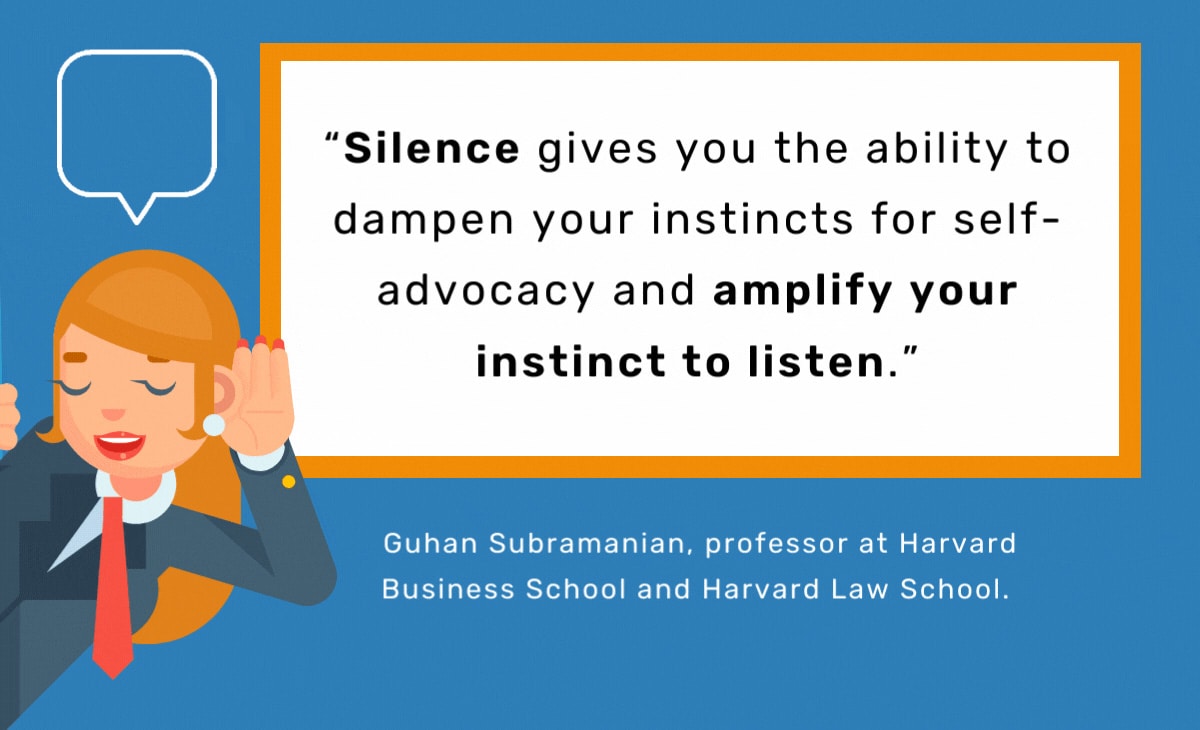
So let’s say you’re speaking with a prospective borrower on the phone. After they’ve finished talking, take a few moments to let their words sink in. Take time to truly absorb these words before you frame a response.
This allows you to be more authentic in your interaction rather than coming off as just another pushy sales pitch.
More importantly, silence also helps avoid anchoring bias.
Anchoring bias is when we rely very strongly on the very first piece of info we receive about a topic. Silence helps us avoid making an offer first and instead, focus on goals and alternatives from the other side.
And if they present an ‘unreasonable anchor’, your silence will be more effective in deactivating it than vehement counter-arguments would!
3. Don’t Split the Difference
Remember, negotiation is very different from bargaining If you’re a skilled negotiator you will not need to haggle with your clients.
And if you win, the other side does not ‘lose’, they walk away from the interaction as winners too! If either party feels like they lost, both sides have lost in the long run.
Leave the haggling for an outdoor bazaar.
If the prospect is hesitant about the price, the issue probably ISN’T the price but the value they think they’re getting for it.
You might want to think about pivoting to a new approach to better present that value to them.
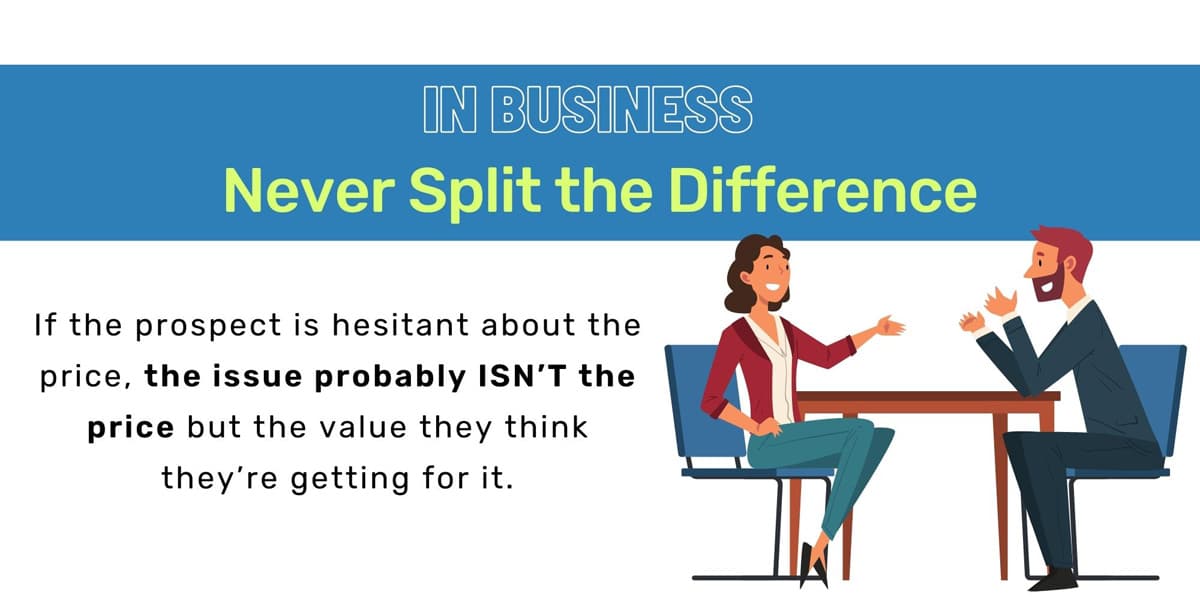
Of course, we don’t want to stall negotiations by saying ‘no’ outright. There are many ways to say ‘no’ without actually saying it.
For instance, you can focus the conversation on their concerns. To get them to communicate, ask clarifying questions like:
- Tell me more about…
- What makes you hesitant about…
- How do you see us accomplishing…
Try these simple cues and see how they work for you!
4. Emphasize Interests Not Positions
When in the midst of a top-dollar negotiation, it’s easy to fade out the borrower’s opinions, feelings, and background.
Separate the person from the problem.
When conflicts arise and a borrower is hesitant to commit to the terms of the mortgage product, focus on desired outcomes instead of throwing concessions at it to resolve the issue.
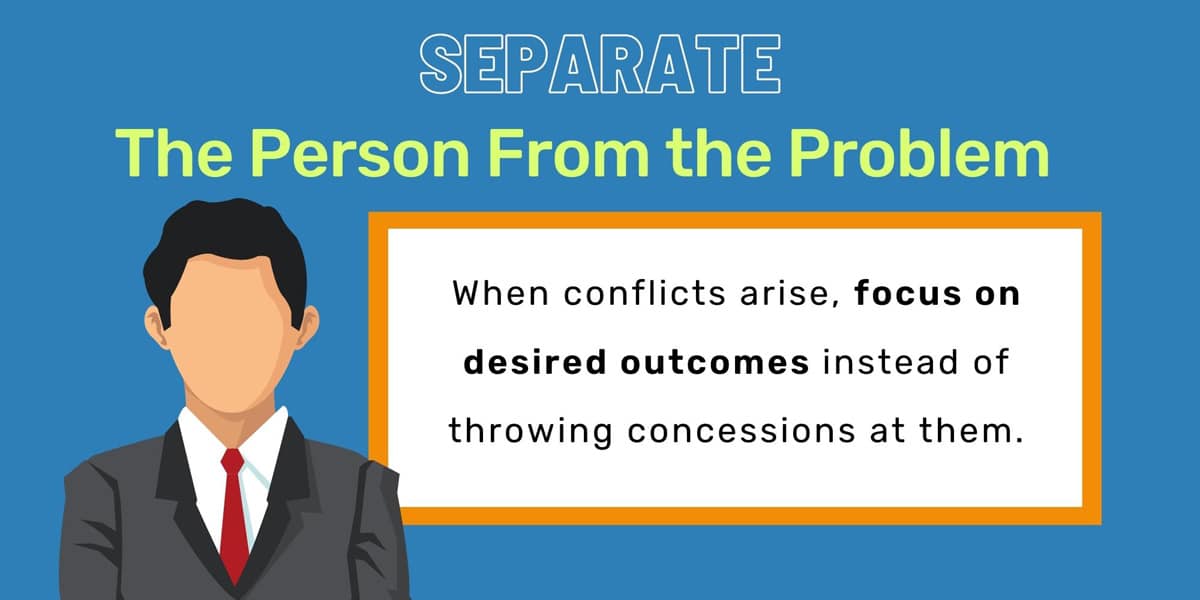
Emphasize common interests with the client; “Why is a mortgage important to you, how do you see it serving you ‘X’ years down the line, what do you absolutely not want to compromise on?”
By opening the floor to the borrower’s interests, you immediately create a welcoming space that increases your chances of a successful closure.
5. Close Like Oprah
People who’ve interacted with Oprah Winfrey or her staff walk away with a very memorable impression.
Oprah’s approach is to make you feel respected, heard, and like you’ve made the right decision being part of that interaction. She especially emphasizes these as you leave.
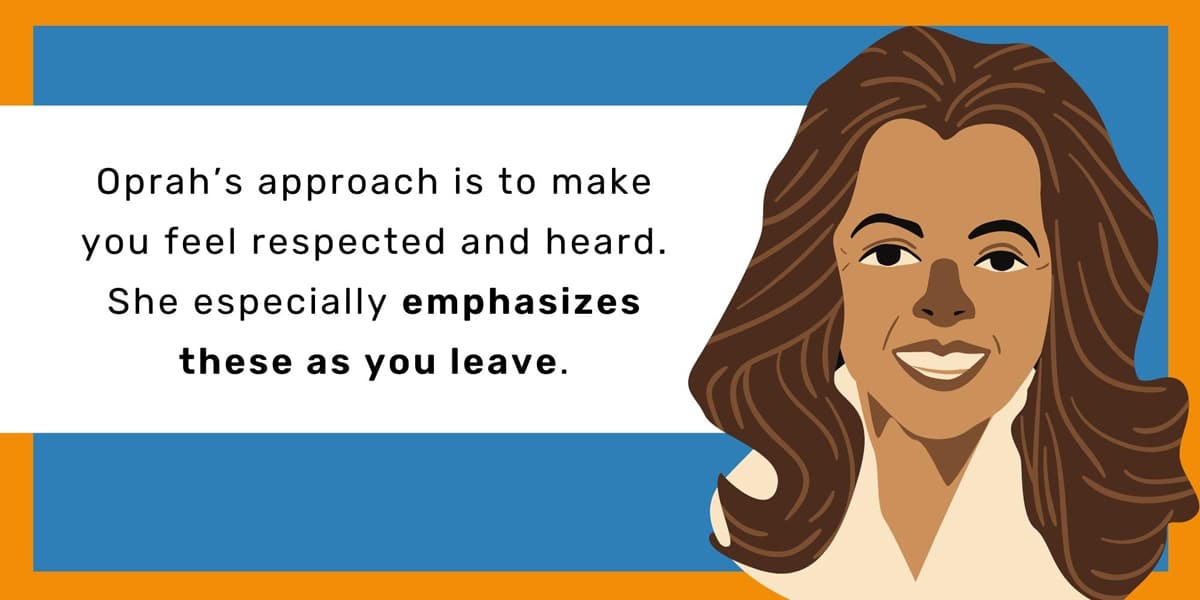
Because your last impression is your lasting impression!
While most salespeople are tempted to throw in one final pitch at the end, Oprah emphasizes on closing with something that is positive and reassuring….
What would that look like for a loan officer?
“I would be honored to help you with your mortgage. This could be a very productive relationship based on what I’ve heard today.”
Simple yet powerful, isn’t it?
We’ll leave you with this:
All of these techniques may not work 100% of the time for your business. The goal here is not to imitate but to shape your own negotiation signature over time based on these proven strategies.
Don’t be afraid to experiment, make mistakes, and refine your technique.
You’ll come out the other side even stronger!
chapter 4:
Loan Officer Technical Skills
That was quite the reveal, wasn’t it?
Now that you’re savvy with the essential soft skills, let’s talk about those key technical skills that will serve you very well in your Mortgage Loan Officer journey.
ZipRecruiter found that “MS Office” was one of the top software skills included in loan officer job descriptions AND loan officer resumes.
But that’s just the tip of the iceberg. Let’s take a look at the full suite of loan officer software that you can start familiarizing yourself with.
Keep scrolling!

Why Are Technical Skills So Important For MLOs?
In the information age, most jobs require at least some percentage of technological acumen. We’re seeing computers, software, and algorithms automating tasks that once took an excruciatingly long time to complete by hand.
With computers, those troubles are behind us!
Loan officers have embraced technology. They handle a LOT of sensitive financial data. They also see themselves hopscotching between dozens of clients daily. Think about it, accidentally changing a single number could cost the company thousands.
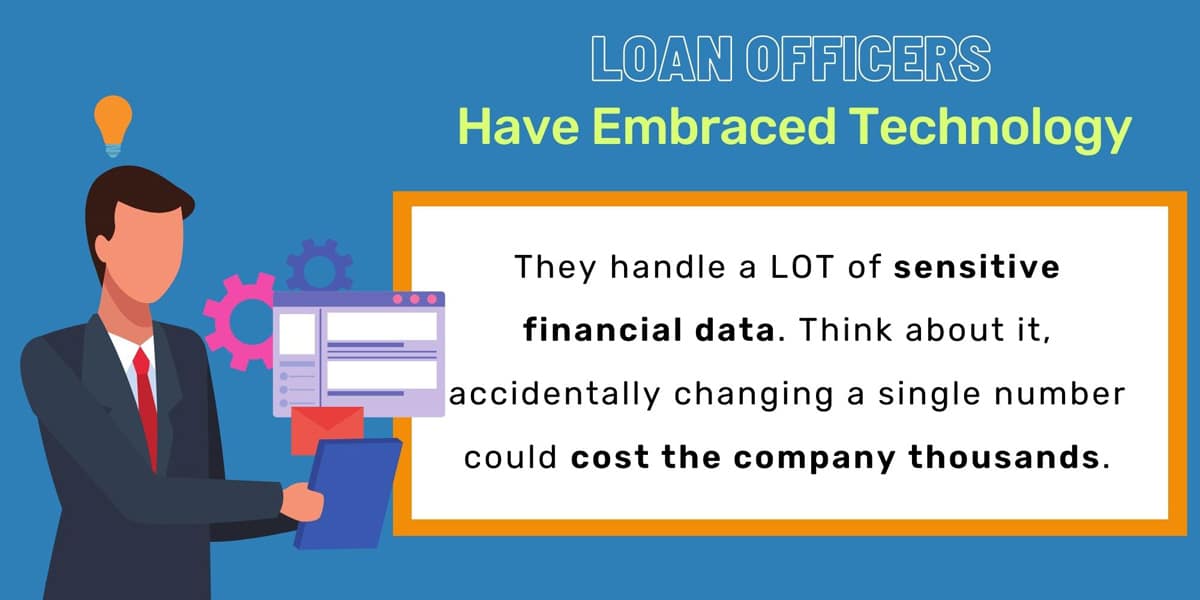
And because most jobs have become remote post-pandemic, much of your communication will be handled via your phone and computer anyway.
It’s easy to see why the value of the global FinTech market is estimated to reach $305 million by 2025. And a staggering 90% of lenders are confident that this technology vastly improves the mortgage process!
How do you get ahead of this technological curve?
Start with the following software:
Calyx Point
This is every loan officer’s secret weapon! Calyx has been a mainstay in the mortgage world since 2004.
It is a cloud-based Mortgage Loan Origination System (LOS) that supports the entire lifecycle of the loan; from pre-qualification to processing to closing.
It helps automate and optimize key duties like:
- Customizing workflows
- Handling 1003 disclosures
- Managing documents
- Centralizing reporting
- Tracking loans at every stage of the process
- Creating granular access rights for each borrower
And much, much more!
Calyx can streamline the loan process for all types of clients, regardless of monetary size, property preferences, or complexity of mortgage terms.
That said, there have been a few complaints about the outdated interface.
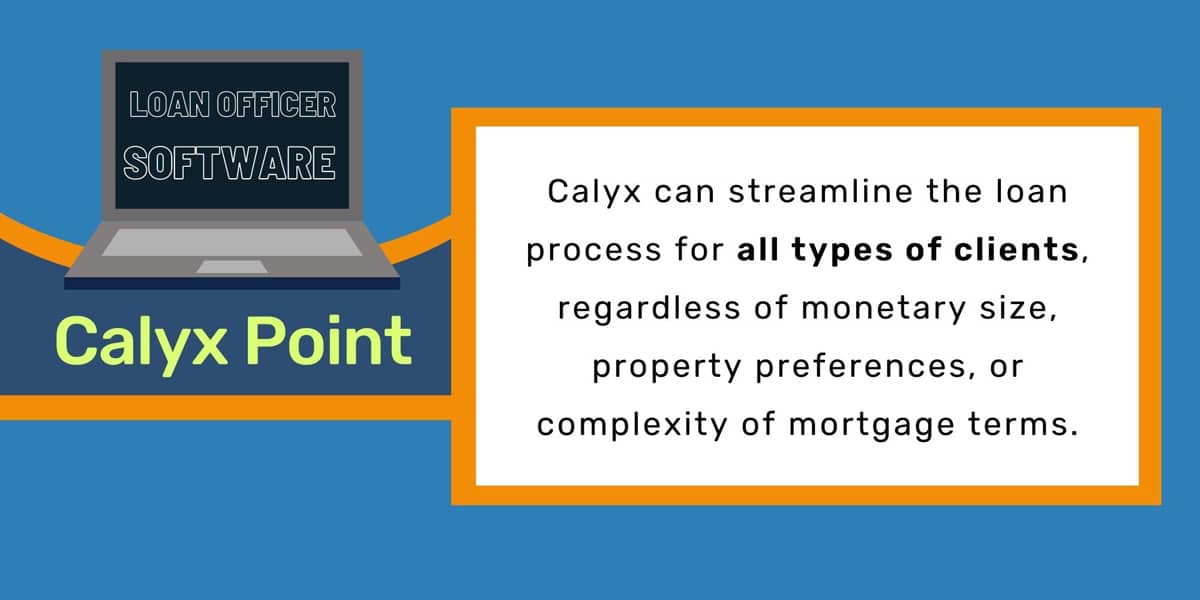
If you haven’t already, try familiarizing yourself with this software. It would be a fantastic addition to your loan officer resume!
Floify
Floify is another hot-ticket software in the Mortgage Loan Origination world. It is a wonderful front-end LOS that helps loan officers streamline workflows and vastly improve the customer’s experience.
By its own admission, Floify is one of the most advanced digital 1003 and document portals.
It has become a favorite for the end-to-end documentation of loans that eliminate instances of lost documents and duplicate requests.
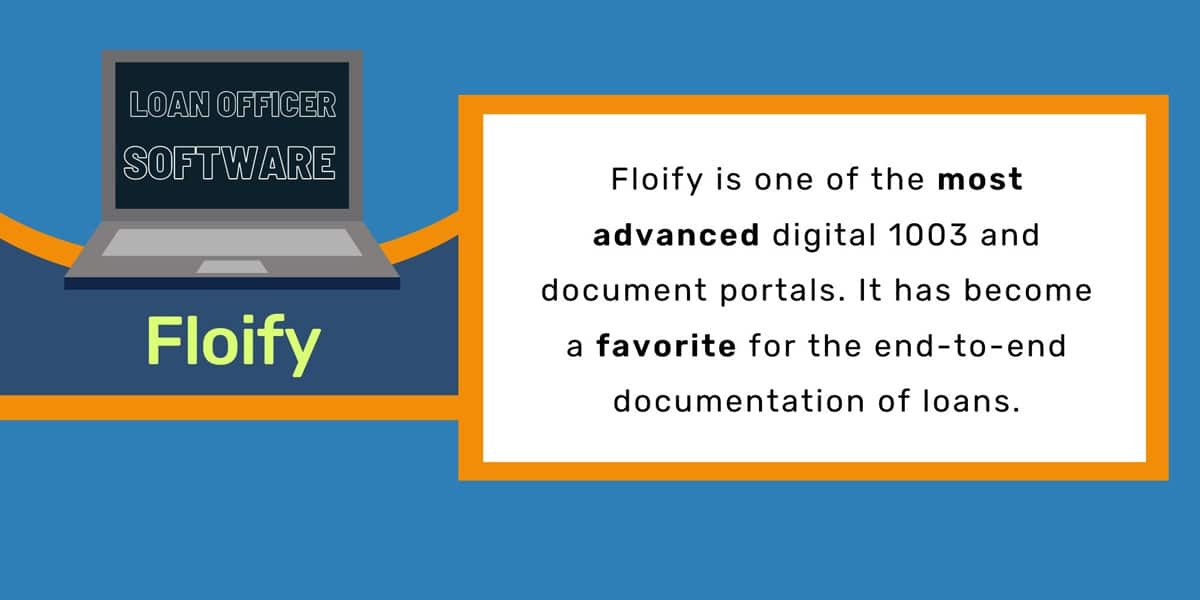
Let’s take a quick look at the features:
- Collecting and verifying documents
- Offering step-by-step 1003 application guidance for borrowers
- Sending automated emails and SMSs about deadlines and loan statuses
- Closing borrowing pipelines
- Automating soft credit pulls
- Providing advanced reporting and analytics
- Offering multi-branch support
We could go on!
What we love is that Floify is a very easy interface for both borrowers and MLOs. With the level of customization available, any loan officer can easily fit their current workflow into Floify.
Make sure to keep this software at the top of your learning list!
Lending Pad
Another LOS giant that is a valuable add-on to your technical skills. Lending Pad is a cloud-based LOS that improves real-time collaboration on loan officer tasks.
When you work with Lending Pad, you will have access to:
- A built-in Customer Relationship Management tool (CRM)
- Automated compliance checks
- Granular loan tracking
- Document archiving
- Lead and campaign management
And so much more!
The amazing thing about Lending Pad is it can integrate with software like Floify to help you streamline your MLO duties.
Some users have reported switching from Calyx to Lending Pad because of the price, technology, and user-friendliness.
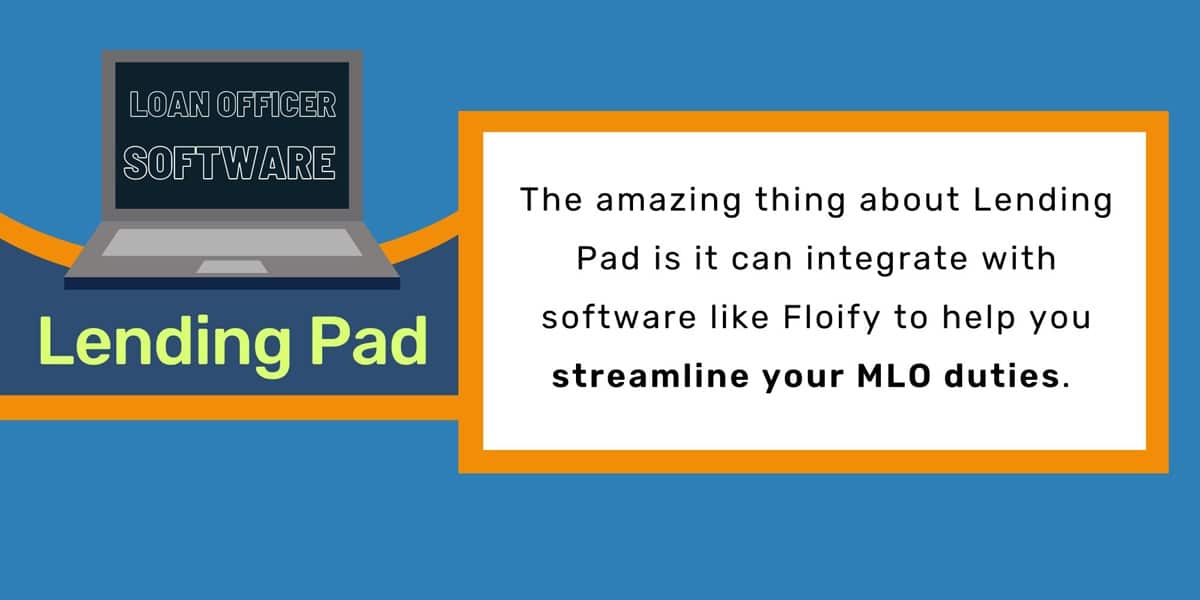
Lending Pad is worth checking out, even if you’re starting your loan officer career and are working with a handful of clients!
MS Office
The foundational software for loan officers to run their day-to-day business!
It’s incredibly important to familiarize yourself with MS Office even before you start your career as a loan officer.
Apart from being the most widely-used productivity software in the world, MS Office has even been used by several loan officers as their standalone business software.
Excel, in particular, is an effective way to database your leads and manage the loan pipeline.
We’ve seen that with the proper planning, strategies, and time management, you can run your MLO business from Excel.
That said, it does make sense to also rely on more advanced software once you begin scaling your business.
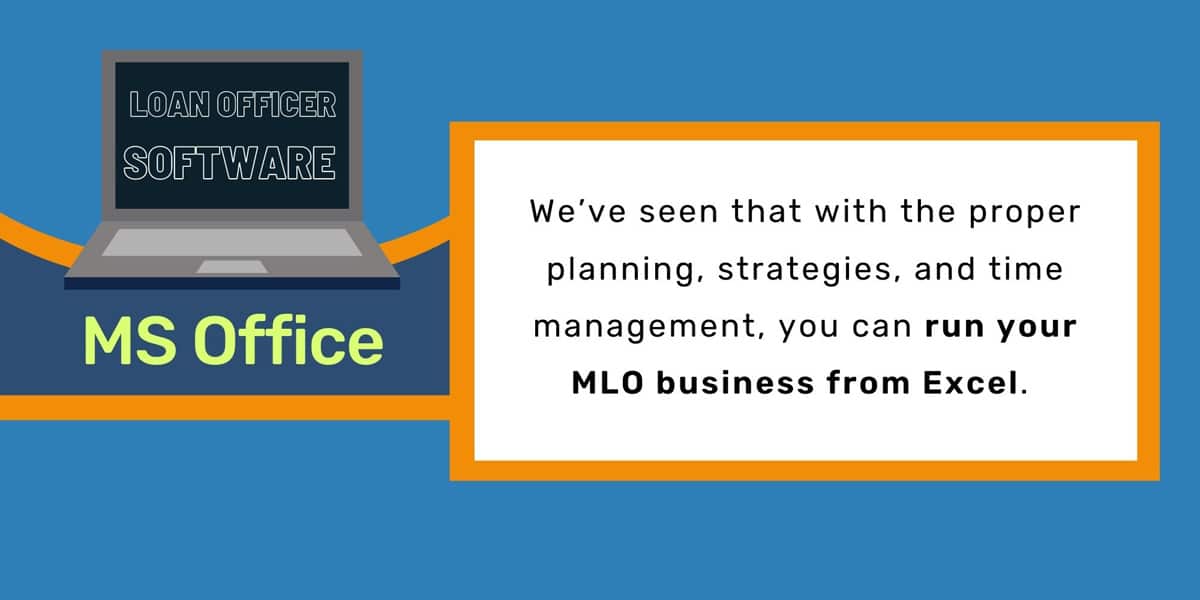
You’re probably already super familiar with this software. However, we also encourage you to learn the intricacies of Excel to make your life easier.
For instance, take a look at how to:
- Restrict inputs using the data validation function
- Transpose data from a column to a row, and vice versa
- Calculate the math quickly by using Excel formulas
- Conditionally format certain cells to highlight important data
Start with the above and you’ll become a spreadsheet pro in no time!
Alright, now that you have these technical skills under your belt, there is one last skill you MUST master to excel as a loan officer.
Keep scrolling to find out what this is!
chapter 5:
Loan Officer Analytical Skills
As a Mortgage Loan Officer, you must be very detailed-oriented. You’ll have to catch things that most people miss; for instance, a tiny detail in a loan application that could help determine the loan amount.
Loan officers find themselves switching gears a LOT.
You could start your day interacting with a client to understand their concerns, and end your day reviewing, verifying, and documenting figures on a spreadsheet.
It’s important to be personable and pragmatic.
We’ve shortlisted the top analytical skills to help you out!

Analyzing & Interpreting Financial Data
You probably saw this one coming; A majority of your job as an MLO involves carefully reviewing loads of financial paperwork to determine risk.
As soon as a loan application is submitted, your analytical prowess will kick in.
You will look at the information carefully, enter it in your records, and verify the client’s creditworthiness to interpret whether they are eligible for a loan.
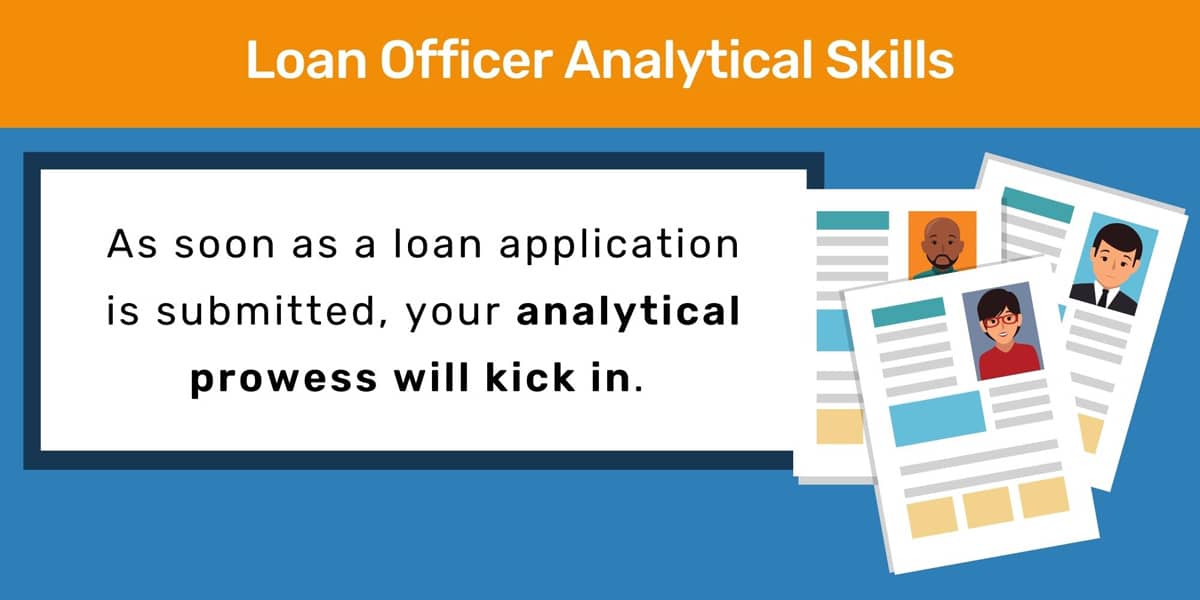
Oftentimes, you will also have to look for missing information or unusual financial circumstances that require further clarification from the client.
Based on the information you collect and examine, you will have to make a decision on whether the borrower is eligible for a loan, what lending product would best meet their needs, and also cater to additional terms like collateral and compliance regulations.
That’s a lot of moving parts!
Don’t be anxious. With time and practice, you should be able to master these skills.
Critical Thinking
Successful MLOs put in the time to refine their critical thinking skills.
You will be called upon to break down complex lending terms in a way that your clients can understand.
You will also have to retain a lot of information; mortgage laws, lending products, compliance regulations, borrower concerns, and more, to pull off a successful loan origination.
At the end of the day, you are in the business of people.
Your job is to make calculated decisions that are in the best interests of your clients, and bode well for the financial stability of the company.
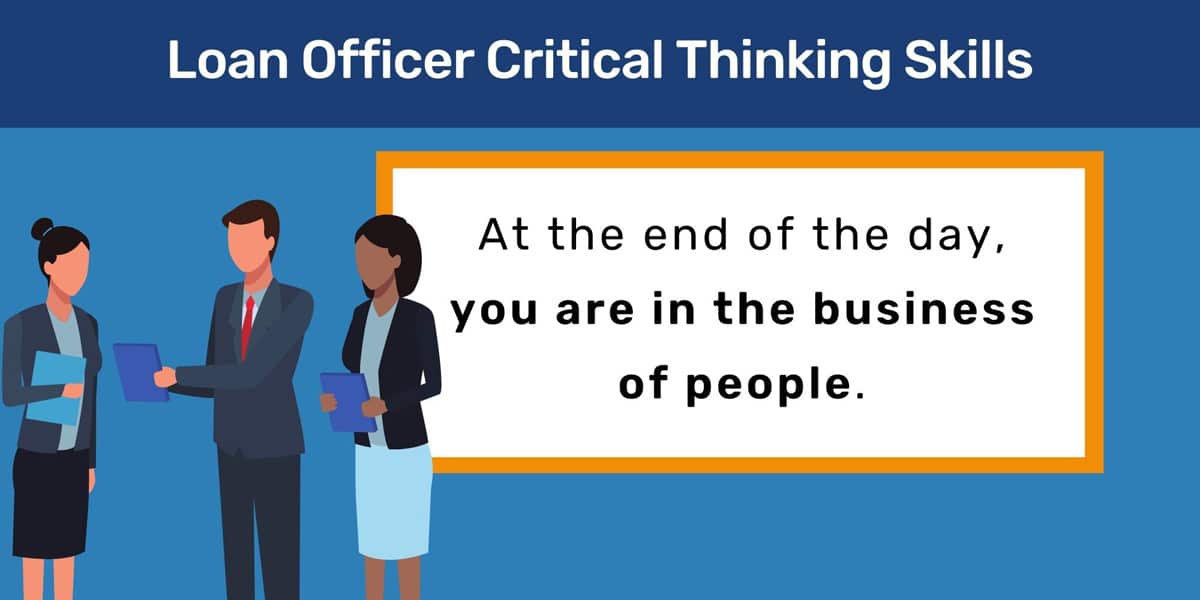
You’ll find yourself applying critical thinking to:
- Recommend the best lending product for each client
- Execute strategies to close particularly complex applications
- Decide credit terms for high-risk borrowers
- Articulate specific loan amounts and their terms
- Resolve conflicts in emotionally-charged interactions
…to name a few!
You can see why critical thinking is an absolute must for Mortgage Loan Officers.
Additional Education
Apart from procuring an MLO license to practice legally in your state, there are no mandatory educational requirements for loan officers.
Recruiters prioritize applicants who have an undergraduate degree in accounting, economics, business or finance.
These fields give you the foundational knowledge to quickly grasp new concepts and excel in your job that much faster.
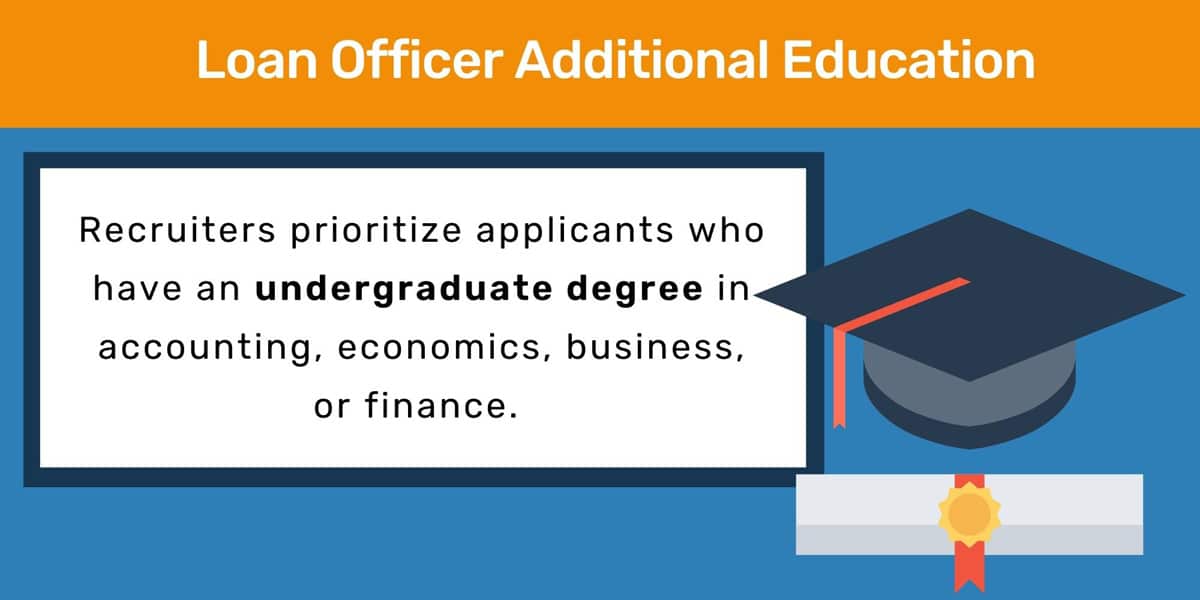
Experience certainly helps!
If you are able to get experience in a related field like customer service, loan processing or sales, you could stand out in a big way from the other candidates.
In fact, some colleges provide specialized programs – graduate certificate level or associate – in subjects like mortgage banking.
A focused program like this could be perfect if you want to grow quickly in your MLO career.
Your Loan Officer Skills Will Take You Very Far!
It’s time to take a breather and digest all that information.
We explored a lot of important loan officer skills and abilities in this article. Keep this list handy and keep working on it as you move through your MLO career.
Remember, even the most successful loan officers had to start somewhere. The journey to earning a seven-figure paycheck is a marathon – It requires patience, dedication, and hard work.
Our key takeaways; Always prioritize quality service. Make sure every client who walks through the door feels heard, understood, and valued.
This is where your interpersonal skills come in. Be persuasive NOT pushy. Emphasize outcomes and value over positions and price.
Above all else, prioritize your learning. Mortgage laws will change. The industry will change. Borrower needs and lending products will change. A loan officer who is adaptive to this shifting climate will chart a very successful career path.
We wish you the very best!
Do you have any questions or thoughts about the loan officer field?
We’d love to hear them! Please leave a comment below.
